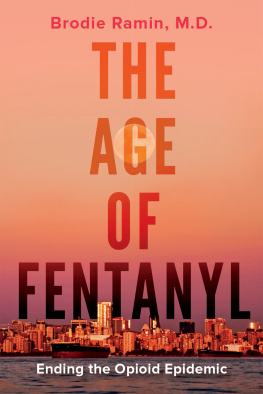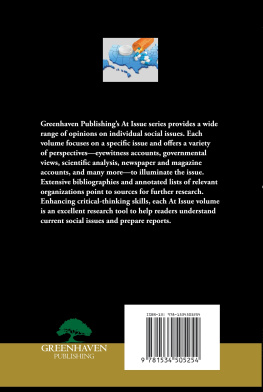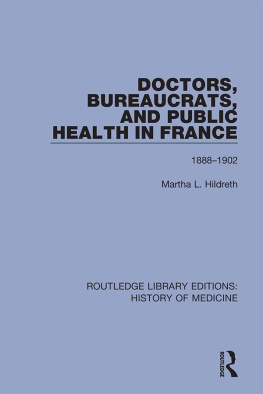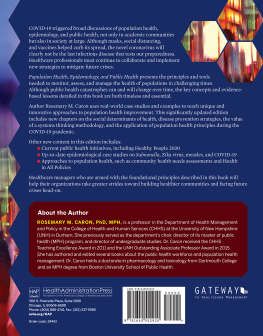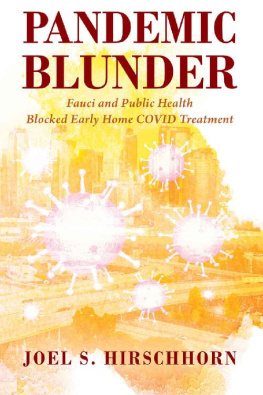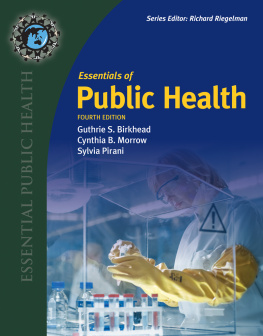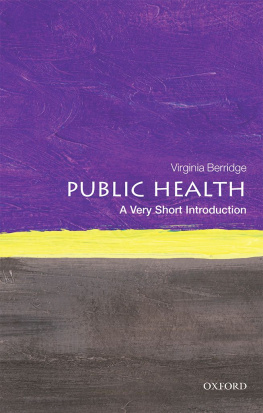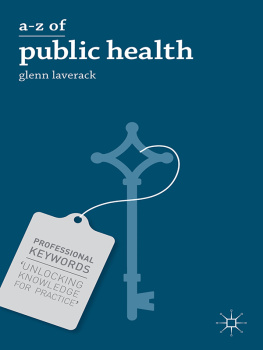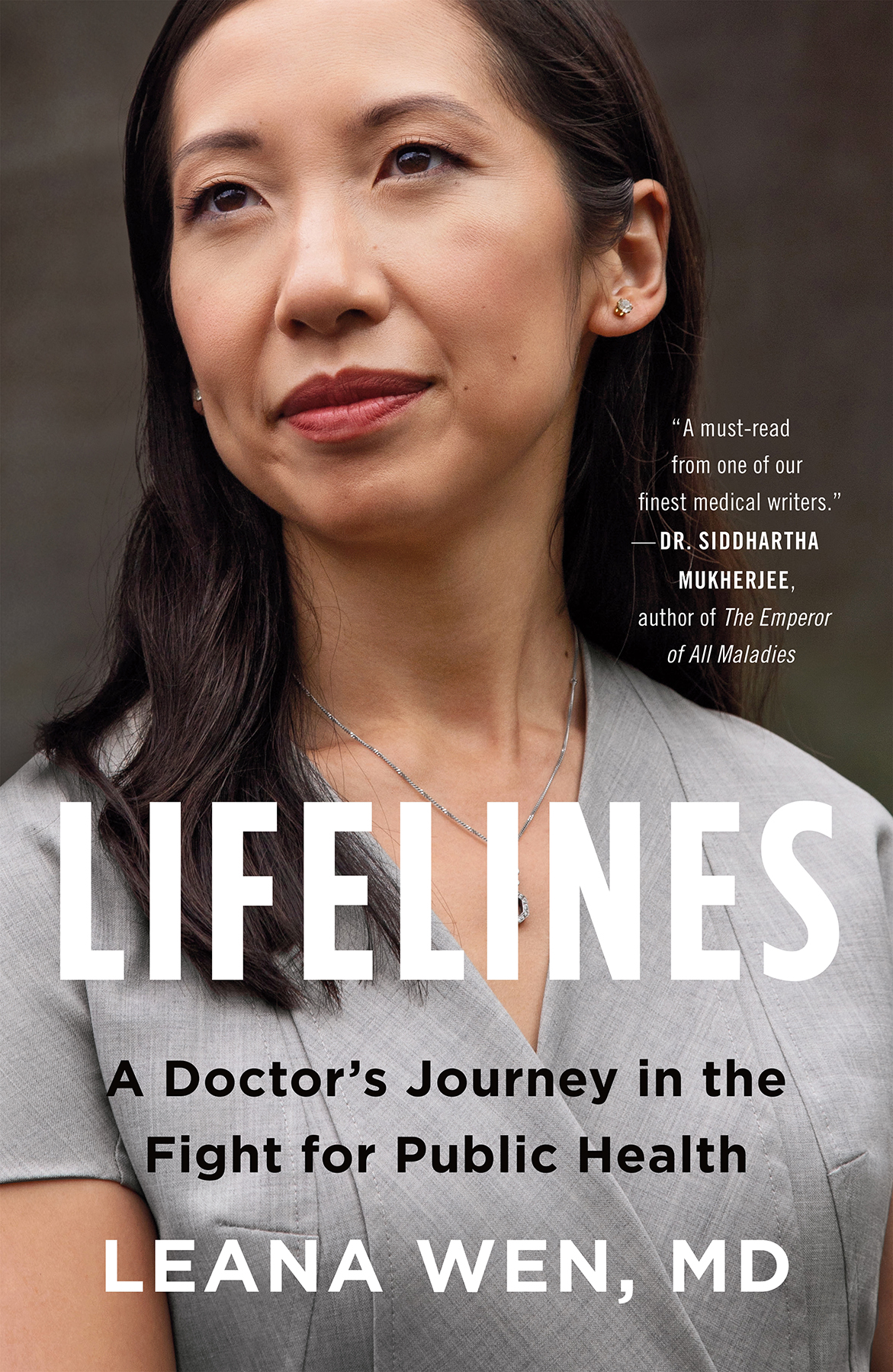Contents
Guide
Pagebreaks of the print version

The author and publisher have provided this e-book to you for your personal use only. You may not make this e-book publicly available in any way. Copyright infringement is against the law. If you believe the copy of this e-book you are reading infringes on the authors copyright, please notify the publisher at: us.macmillanusa.com/piracy.
To Sebastian, my partner in this life journey, and to Eli and Isabelle. You are our everything.
Our children are living messengers to a future we will never see. The question is how we will send them. Will we send them strong? Will we send them hopeful? Or will we rob them of their destiny, their dignity, and their dreams? Will we take from them their health and their ability to succeed before they even have a chance to get started?
No, we cannot do that. We will not do that. We must not do that.
Representative Elijah E. Cummings (19512019)
The first sign of something wrong was the sound of a high-pitched squeak.
Whats that? Christine whispered. I had just opened the door of the apartment complex my family shared with hers and two others. We looked at each other as the noises continued. It was a wet rattle and wheeze.
Then we heard someone shouting in rapid-fire Spanish. I grabbed Christines hand, and we ran toward the noise.
It was the apartment next to Christines. The door was open and we saw that the noise was coming from Tony. He was in the third grade, two behind me and Christine. Tony was sitting upright, straight as a board, clutching the sides of a rocking chair. His cheeks were streaked with red. His breathing was short and shallow. Each exhale ended in a wheeze and a squeak, each shorter than the one before.
His eyes were wide and beads of sweat ran down his face. He looked terrified.
I knew that feeling well. Asthma.
Tonys grandmother was yelling and begging us to help. There was an inhaler on the floor. I grabbed it and held up it up to Tonys mouth. I pressed it, but nothing happened.
I got my own inhaler out of my backpack and pulled his lips open. I pressed twice. I took it out and tried again.
The medication dribbled out of his mouth. His eyes were starting to close. His breathing was slowing and I could barely hear the wheezing. His lips were turning purple and blue.
Christines mother had heard the noise. She held the phone in her hand. We need to call 911!
No, no, no! The grandmother yelled. Policia, no! No policia!
Not police, ambulance. Medical. Doctor. 911!
I was holding Tony up, and he felt heavy in my arms. His grandmother shook him and begged him to wake up. She thumped him on his back. She grabbed him by his hair.
Christines mother had been a nurse back in her home country. She lifted Tony and laid him flat on the floor. She pressed on his chest and breathed into his mouth.
Eventually, she stepped back and shook her head. The grandmother began to wail.
We listened to her scream and cry all night.
Do you think Tony would have lived if wed brought him to a hospital? I whispered to my mother as we lay in bed. In Shanghai, where I was born, Id had such severe asthma that I ended up in the hospital nearly every month. It was terrifying to fight for air, but I always knew that once I got to the hospital, the doctors would make me better.
Maybe he was so sick that nobody could have helped him, my mother said.
What about 911? In school, they always say to call 911 and an ambulance will come.
Who knows who else would come? Maybe the police. They could all be deported and sent back to Mexico.
So if something happens to you, I shouldnt call 911 because youll be sent back to China? What about Fatherwhat if his ulcer bleeds and hes very sick?
Think about what happened to your father in China. Going back is not better than death.
But thats not right, I remember saying. How come other people can call the ambulance and go to the doctor? Why is it different for us?
My mothers answer fixed my future. Life is like this for some people. Maybe one day you can change things for people like Tony and your father.
That night cemented my decision to become a doctor so that when I encountered another Tony, his life would not have to end in a preventable death.
Fifteen years later, I did meet another Tony. He, too, was a third grader with severe asthma. I got to know him because he and his mother would come to the emergency department every week, sometimes multiple times. He always had the same symptoms: wheezing, coughing, and gasping for breath. When it was particularly bad, hed get that familiar frightened look in his eyes, the look of not knowing whether the next breath would come.
Each time, I had every medical tool at my disposal. Id put a mask on him to administer oxygen and nebulizers. Id give him steroid medications. Id monitor his breathing. Most of the time, hed get better within a couple of hours and go back home.
But he kept on returning, week after week. He and his mother were homeless. They shuttled between shelters and the homes of different relatives and friends. His clothes always reeked of cigarettes because his mothers boyfriend and her family smoked. At some point, they moved into a home of their own, but his asthma didnt improvethey were in a row house where all the units were vacant and harbored mold and other allergens. Two blocks away, an incinerator pumped out toxins.
This Tony was being treated at one of the best hospitals in America. Every time he got sick, wed make him better. But medicine could not treat the poor air quality he breathed. Medicine could not change the poverty, instability, stress, and powerlessness of his and his mothers lives. This Tony, too, was a testament to the notion that the currency of inequality is years of life.
This is a reality I knew all too well from my childhood. My family and I came to the United States from China with less than $40 to our name. We lived paycheck-to-paycheck and worried every month about making the rent. Inequality left a mark on everyone I knew: my classmates, who became victims of gun violence; their families, who were decimated by drug addiction; our neighbors, who died young from preventable diseases.
I became a doctor to save Tony. I chose emergency medicine so that I could treat everyone and turn no one away, not immigrants afraid of deportation or people who couldnt pay. But working in the ER was also where I saw the limitations of health care. I could resuscitate a young man dying from gunshot wounds, but what could I do about the violence on the street, violence so consuming that elementary schools didnt have recess outdoors? I could stitch up a childs laceration, but what could I do about the ache in her belly because the last meal she ate was her school lunch two days before? I could prescribe drugs for diabetes and heart disease, but how could I recommend healthy eating knowing that the corner store my patient depended on for food sold no fruits or vegetables?
It wasnt just health care that my patients needed: it was public health. Public health is housing. Its food. Its clean air. Its education. Its the ability to level the unequal playing field. Its the social supports that give everyone their best chance to survive. For so many people indeed, for all of uspublic health is our lifeline.
There is a saying that public health saved your life todayyou just dont know it. Public health works when its invisible, because it prevented something from happening. It is the forgotten subject that no one thinks about. Politicians dont campaign on a platform of public health. Budgets dont prioritize public health. Even the U.S. health-care system treats public health as the forgotten stepchild, with less than 3 percent of Americas total health-care spending going toward it.


